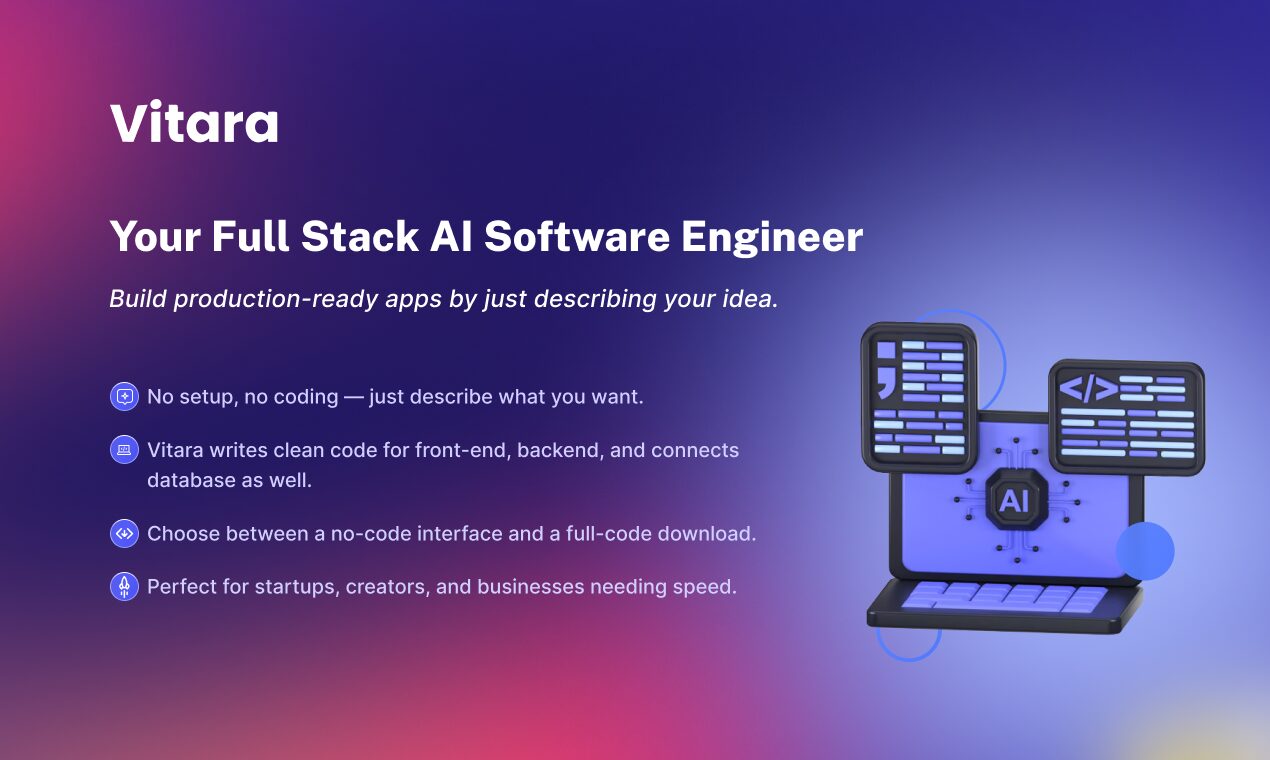Table of Contents
Overview
In today’s fast-paced digital world, bringing an app idea to life quickly and efficiently is paramount. Enter Vitara.ai, a revolutionary AI-powered vibe coding tool designed to empower anyone to build full-stack applications using just a simple prompt. Developed by Prismetric Technologies and co-founded by Ashish Parmar, this innovative platform has already attracted over 10,000 users in just 6 weeks. Whether you’re a founder eager to launch an MVP, a maker testing a new concept, or a developer looking to accelerate your workflow, Vitara.ai promises to transform your ideas into live apps in minutes, all without writing a single line of code.
Key Features
Vitara.ai stands out with a robust set of features tailored for rapid app development and customization:
- Prompt-based app creation: Simply describe the app you envision in natural language, and Vitara.ai’s AI will interpret your request to generate a functional application.
- Full-stack generation: Unlike tools that only handle the frontend, Vitara.ai builds both the user interface and underlying backend logic, providing a complete working solution.
- Vibe coding interface: Embracing the latest “vibe coding” methodology coined by Andrej Karpathy, the platform requires no coding knowledge, opening up app development to a wider audience.
- Instant deployment or download: Once your app is generated, you have the flexibility to deploy it live with a single click or download the entire codebase for further customization.
- AI-enhanced app customization: Beyond initial generation, the AI assists in refining and customizing your application, ensuring it meets your specific requirements.
How It Works
The magic of Vitara.ai lies in its straightforward and intuitive vibe coding process, making app creation accessible to everyone. Users begin by describing the app they want to build in natural language, much like having a conversation. Vitara’s sophisticated AI then takes this prompt and intelligently interprets it to generate a fully working full-stack application using React for the frontend and Supabase for the backend, with Node.js support coming soon. Once the app is generated, users are presented with options to either edit the application directly within the browser-based platform, download the complete codebase for offline use, or deploy it instantly to make it live and accessible to users.
Use Cases
Vitara.ai’s versatility makes it an invaluable tool across various scenarios and user types:
- Entrepreneurs building MVPs: Quickly validate business ideas by launching minimum viable products without significant upfront investment in development.
- Makers testing product ideas: Experiment with different app concepts and gather user feedback rapidly, iterating on designs with ease.
- Developers accelerating prototyping: Speed up the initial phase of development by generating boilerplate code and core functionalities instantly, freeing up time for complex features.
- Educators demonstrating app concepts: Provide practical, hands-on examples of app development to students without delving into intricate coding details.
- Startups accelerating time-to-market: Drastically reduce the development cycle, allowing new businesses to launch and gain traction much faster.
Pros \& Cons
Like any powerful tool, Vitara.ai comes with its own set of advantages and considerations.
Advantages
- Fast and easy app creation: Go from idea to a functional app in minutes, with 300-400 new users joining daily.
- No coding skills needed: Empowers non-technical users to build sophisticated applications using natural language prompts.
- Production-ready code: Generates high-quality, maintainable code that follows best practices and industry standards.
- Browser-based with zero setup: Start building immediately without any software installation or configuration.
Disadvantages
- May lack support for complex logic: Highly intricate or niche backend functionalities might require manual coding or workarounds.
- Limited current tech stack: Currently supports React and Supabase, though React Native, Flutter, and Node.js support are coming soon.
- Still in active development: As a growing platform launching new features regularly, some capabilities might still be evolving.
How Does It Compare?
When placed alongside other popular tools in the development landscape, Vitara.ai carves out its unique niche in vibe coding and prompt-to-app generation.
- Bolt.new offers a comprehensive browser-based IDE with WebContainers technology for full-stack development, but focuses more on traditional coding workflows rather than Vitara.ai’s natural language prompt approach.
- Lovable provides chat-based React and Tailwind app building with strong conversational interfaces, competing directly in the AI-assisted development space, though Vitara.ai differentiates through its broader full-stack generation and deployment capabilities.
- Replit Ghostwriter excels in line-by-line code suggestions, debugging assistance, and educational coding support, but primarily serves as a coding assistant rather than the complete prompt-to-app generation that defines Vitara.ai’s core value proposition.
- Softr is a strong contender for building UI-focused web applications from existing data sources like Airtable, but Vitara.ai distinguishes itself by building the entire backend from scratch based on prompts, offering a more complete solution for those starting from an idea.
- Builder.ai provides a more comprehensive, enterprise-oriented platform often involving human assistance in the development process, making it more complex and less immediate than Vitara.ai’s streamlined prompt-to-app approach.
Final Thoughts
Vitara.ai represents a significant leap forward in democratizing app development through vibe coding methodology. Its ability to translate natural language prompts into fully functional, full-stack applications without requiring any coding knowledge is a game-changer for entrepreneurs, makers, and even seasoned developers looking for rapid prototyping solutions. With strong early traction of 10,000+ users in 6 weeks and a 4.8/5 Product Hunt rating, the platform demonstrates clear product-market fit. While it may have limitations for highly complex backend logic and is still expanding its tech stack, its speed, ease of use, and production-ready code generation make it an incredibly powerful tool for bringing ideas to life with unprecedented efficiency.
